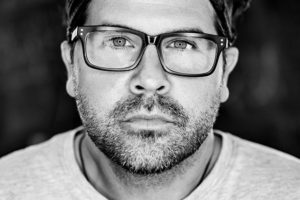On March 16, Rande Cook, a Kwakwaka’wakw artist born in Alert Bay, will give a lecture at Camosun on contemporary Indigenous art and its origins as part of the college’s Visiting Artist Series. Cook is an accomplished multimedia artist who has apprenticed, researched, and honed his craft while working all over the world. That’s why it came as a surprise to a lot of people when he decided to pursue a master’s of Fine Arts.
After 20 years, Cook had reached a point in his career where he felt he had plateaued. He wanted to challenge himself and to experiment on more public installation work. However, public institutions often look for a degree when artists submit their work.
“I want to be more of a storyteller,” he says. “I want to really uphold and embrace my tradition and share it with the world… I kept finding that because I don’t even have a bachelor’s, it was a lot more difficult, even though my portfolio was strong.”

Without a bachelor’s degree, a master’s program is even more demanding. For it, Cook is required to take additional courses, including Art History, but there is an invisible adjective in front of that class title. Western Art History doesn’t include Indigenous art, and contemporary art galleries are unsure of where it fits.
“I didn’t realize just how challenging it would be, and I say this [as an] Indigenous artist,” he says. “And one of my questions is why are you pounding me with western art history when you don’t acknowledge my history? I have 20 years—I have, like, a PhD in my art history—and it’s not even acknowledged.”
From 2015 to 2016, Cook held the Audain Professorship of Contemporary Art Practice of the Pacific Northwest within the Visual Arts department at the University of Victoria. In his program now, he is learning alongside students he taught at that time. The experience of learning in an institution is so different from the ways he learned as an apprentice of master carver John Livingston. For example, beyond design and history, he learned economics.
“So, going back to the university, there’s, like, not one conversation about economics,” says Cook. “These kids go on to school, and then once they’re done, they don’t even know how to sell their work.”
While Cook navigates the university structure with a wide range of knowledge as a successful artist, professor, and, now, student, he finds himself asking big questions about defining the art form, its origins, and whether it fits in the category of modernism or postmodernism. However, questions of origins are intertwined with questions of land and who controls the resources on those lands.
“[We’re] still struggling and being forced out of our traditional lands due to industry, and capitalism, and how it’s actually starting to shift the art as well, in a contemporary sense,” says Cook. “This is a really, really interesting conversation and I think these are the things that need to be spoken about in a public arena.”
Cook is an optimist, and throughout this deeply polarized time, he is always thinking about ways to connect people and ideas. As a hereditary chief, Cook has an obligation to protect the future of the lands he has say over.
“It’s protecting the freedom for all of us to say and feel and to know that we’re valid. Everybody has emotions and those emotions are real and we deserve to express that,” he says. “I think that’s where my optimism comes in—you still have to keep thinking about love within all of this.”
Rande Cook
2:30 Monday, March 16
Free, Young 216, Lansdowne campus
camosun.ca/art
